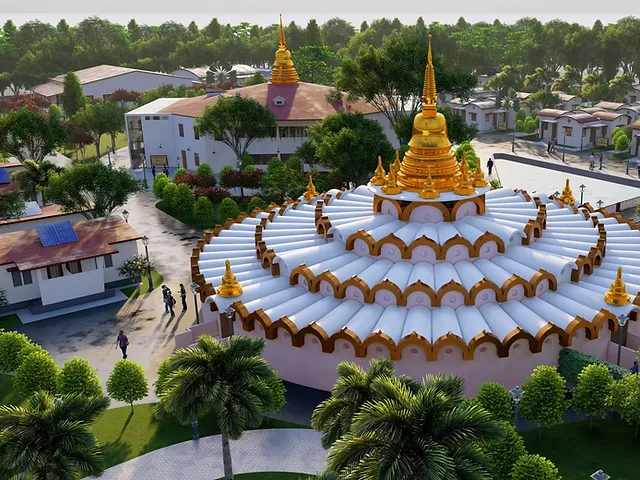“An eye for an eye makes the whole world blind.”
The path of peace, says this age-old aphorism, offers better resolutions to conflicts than revenge, which only leads to counterretaliations.
This philosophy is deeply rooted in Vipassana’s meditation centre in Rangpur, Rajkot. Staying true to its beliefs, the centre is handling a sensitive issue with dignity and poise instead of getting into a confrontation.
A nearby mosque in Targhari village has allegedly turned its loudspeakers towards the meditation centre. The change in direction of the loudspeakers for namaz has affected the tranquillity of the Vipassana centre, as the participants are getting increasingly distracted by the noise.
The distance between Rangpur and Targhari is hardly 35 km.
“As soon as we launched our centre, the mosque’s loudspeakers turned in this direction. Muslims also register for our 10-day course. The Muslims in the nearby village may not be aware of this,” said Dhirubhai Parmar, who is working with the Vipassana centre.
The centre’s trustee, Ghanshyambhai Saparia, said, “Our organisation is not limited to any sect, caste, community, gender or nation. We are for everyone, and we believe in oneness. People who came to practise in this centre were distracted owing to the sound of azaan. Our team went to Targhari to spread awareness about Vipassana, bust myths, and encourage them to attend the 10-day shibir. We didn’t get much response.”
He added, “Now, we are planning to formally invite the Maulvi and trustees of the mosque to attend a session so that they understand we are not here just for Hindus.”
Vipul Shah, a resident of Rajkot, said, “The intensity of sound is higher during winter. As a new student of Vipassana, it becomes difficult to concentrate. The technique requires focus, silence, and hours of sitting (in one place). It is not easy for many of us since the azan is played daily more than two times. I hope something is done about it.”
However, Salim Shaikh, a resident of Targhari, contested the claims, insisting the “loudspeakers were always there.”. “We didn’t intend to disturb anyone. We’ve nothing to say about attending seminars.”
Rajeshbhai, who’s associated with the centre, made known that the idea wasn’t to communalise the issue. “Love,” he has stressed, “is the only language we know. We want to invite our Muslim friends to our centre, teach them meditation, and feed them. If they agree, it would be great. We will learn to adjust to these loudspeakers in the worst-case scenario.”
The Vipassana centre in Rangpur was set up around March. Even though the construction work is still not complete, it runs a 10-day course for around 200 students. Over 700 students can learn meditation and offer their services.
One of the most ancient mediation techniques, Vipassana is practised by individuals of any faith. Its practitioners develop a clear and calm mind. Based on Gautam Buddha’s teachings on the foundations of mindfulness, Vipassana enables self-realisation through awareness.
The method is inspired by the Satipatthana Sutta (Foundations of Mindfulness), a discourse attributed to Gautam Buddha himself. Vipassana is a direct and gradual cultivation of mindfulness or awareness. During the 10-day residential course, participants experience beneficial results. There are no course charges, not even to cover the cost of food and accommodation.
Note: Landing image is a reference image of Vipassana centre.











